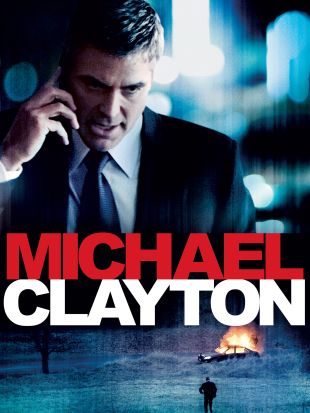
Tony Gilroy's elegantly structured script for Michael Clayton offers a series of plot developments and character details that don't build so much as accumulate in the viewer's mind, until a thunderously entertaining final scene -- the kind of confrontation an old-time Hollywood mogul might call a "corker" -- pays them all off in a thrilling verbal face-off. As a first-time director, Gilroy maintains a steady, measured pace. His style serves his low-key but involving script, quietly adding layers to the characters while moving the plot along. The first-rate editing juggles timelines in the best possible way, allowing events to have a much different meaning when you see them a second time.
George Clooney gives another first-rate performance as Clayton, a man who can keep his clients' lives in order, but not his own. We know, because he is so good at his job, that he will figure out how to get himself out of the seemingly impossible position he gets himself into when his closest friend, an older attorney at the firm, has a mental breakdown while defending a chemical company facing a multi-million-dollar class-action suit. As the friend, Tom Wilkinson gets to deliver all of the film's colorful monologues. Unafraid to recall Peter Finch's performance in Network, Wilkinson offers a realistic portrait of manic depression while also reveling in the florid theatricality of his character's expansive orations. He manages to be simultaneously over-the-top and realistic -- as well as sympathetic. Tilda Swinton, shot in a way that lets the audience know how Gilroy feels about corporate functionaries, makes for an original adversary -- her obsessively detail-oriented character is the one most in over her head. Sydney Pollack, a woefully underappreciated actor, not only hits every note he is asked to play, but gives the film even more credibility as an updated '70s paranoid thriller simply because of his presence.

Midway into the film, Gilroy stages a murder that offers a grueling commentary on the cold-blooded efficiency of modern corporate life. The murder happens close-up. It is hands-on, bloodless, and mechanical, leaving the viewer with an unshakeable sense of unease. The act happens as simply and with as much understatement as everything else in the movie; Gilroy feels no need to punctuate his material with either ominous music or lingering shots of outraged faces. The director never indicates to his audience how horrible what we are seeing is, he takes it for granted that we have the humanity to be appropriately shocked. This is what Gilroy gets very right throughout the film -- he trusts his audience. He repays that trust with that grandly entertaining final scene, where he finally lets the audience release all of the emotions he has kept efficiently bottled up for two hours.
